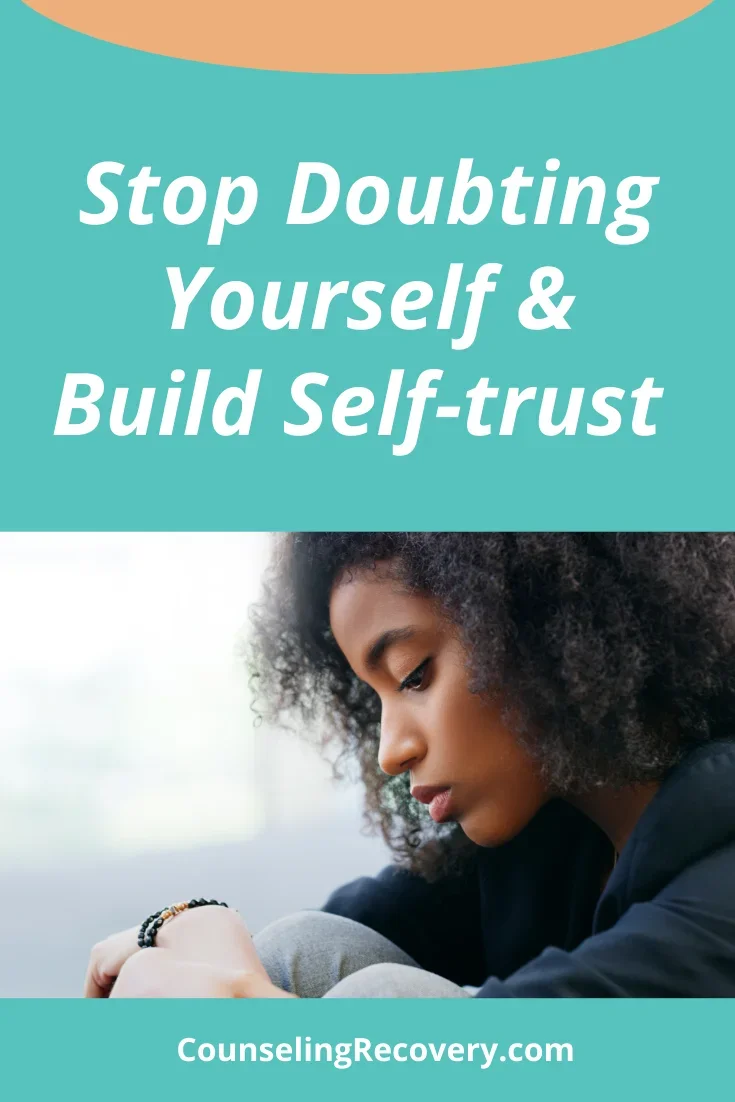Stop Abandoning Yourself: How to Trust Yourself
What does it mean to abandon yourself?
Self-abandonment happens when you dismiss your own experiences because you think they’re wrong.
When you get a bad feeling or have a different opinion, you don’t trust it. Instead, you look to others for the answers.
Even when you know that something’s off, you still need to check it out with someone else to know that it’s right.
What others say dictates your reality instead of being able to trust yourself.
How does abandoning yourself create a lack of self-trust?
Without self-trust it’s difficult make decisions.
For instance, when someone violates your boundaries you can’t speak up. Out of fear, you stay silent hoping to avoid conflict but secretly, your hurt becomes resentment over time.
You may feel more anxious because it takes a lot of energy to deny our feelings. Eventually not letting yourself express emotions can lead to explosive anger - even for the people pleaser.
What causes a person to abandon themselves?
When your feelings aren’t validated in childhood, you learn to doubt your own experience. Thoughts, feelings and gut reactions get dismissed as being silly or unimportant. You tell yourself that you’re being too sensitive.
When our reality is denied - we learn not to trust ourselves. We abandon our wants and needs for the sake of others hoping to stay safe and connected.
As a child, having your reality denied does more damage than what actually happened. This denial makes you feel crazy and is the textbook definition of gaslighting.
In dysfunctional homes, it’s a risk to speak up - especially if you’re not sure what kind of reaction you’re going to get - so you choose to stay quiet. Some children develop addictions to food and other substances as a way to cope with not expressing themselves and their truth.
Children who grow up with a raging or abusive parent learn very quickly to be quiet and get out of the way. Expressing a different opinion could be dangerous for them.
How do you build self-trust?
Like with any new behavior - it takes practice!
First - identify what’s getting in the way and how you are abandoning yourself
Identify negative self-talk. Telling yourself that you are being too sensitive or what you have to say isn’t important are common fears.
Addictions also have a huge impact on our ability to trust ourselves because we are avoiding our own reality by using substances.
Part of the process is to assess where your self-esteem is right now, and acknowledging your gifts. Who other people love about you.
Second - cultivate your intuition. Start paying attention to thoughts, feelings, gut reactions because they are super valuable.
Everyone receives information differently but most of know what that looks like - we just haven’t taken the time to develop it. They make up who you are and when we honor our own experiences, we begin to trust ourselves. When in doubt get feedback!
Three - Practice! Every time you don’t listen to yourself - assess the results. Every time you DO listen to yourself - assess those results too then compare them! I guarantee you’ll be more motivated to follow your feelings.
How does not trusting yourself hurt your relationships?
If you don’t know how to trust your own perceptions you won’t know if a relationship is healthy. You will question yourself when someone mistreats you instead of doing something about it and that’s dangerous because you can’t protect yourself.
Trusting yourself means paying attention to those relationship red flags that serve as warnings - those signs that tell you that something isn’t right.
Maybe your date gets drunk on your very first date - that’s a definite warning sign of possible addiction. Or you are being mistreated in some way but you’re not sure so you give it more time.
Dismissing your own experiences creates self-doubt that morphs into dishonesty in relationships. You unknowingly give a false impression that things are okay when they aren’t. As a result, you put yourself in potentially abusive situations because you miss the signs of bad behavior.
Final Thought on Trusting Yourself
By trusting your own perceptions you are building self trust. Instead of ignoring your gut, you learn to cultivate it. When something doesn’t feel right, you can use that information to make better decisions. WIth practice this gets easier as you begin to see that honoring your experience is the best form of self love you can imagine.

